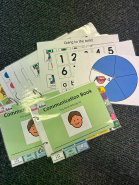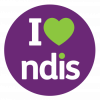It’s not uncommon for children to have difficulty expressing themselves as they start to develop their communication skills. However, you might feel like your child is making no progress, or that they’re turning to alternative forms of communication to tell you their needs and wants.

Our Speech Pathologists work within a multidisciplinary team – employing a range of methods and tools, including augmentative and alternative communication (AAC) – to support children on their journey to improving their communication skills and independence.
Why do some children need the support of a Speech Pathologist?
There are many reasons why your child might need the help of a Speech Pathologist. Your child might need support as a result of a disability or condition – such as autism or cleft palates.
Your child might have difficulty being understood. If this is the case, they may become increasingly frustrated when asked to repeat themselves, and you might find yourself stepping into the role of interpreter.
Some children visit a Speech Pathologist if they’re late saying their first words. Children typically speak their first words at around 12 months of age, but if they don’t, or if they are using non-verbal forms of communication – like pointing to an item – they should be referred to a Speech Pathologist.
Speech Pathologist are also consulted for social communication challenges like difficulty taking turns; interrupting, starting and ending conversations with communication partners; asking for help; managing conflict resolution and perspective; and talking with peers.
How can a Speech Pathologist support your child?
Speech Pathologists can use different tools to support your child, and your family, to deal with and overcome communication challenges. They can use targeted, specific intervention programs, depending on the needs of the child.
They can educate and upskill the people who interact with the child, such as parents, teachers and other caregivers. This will provide your child with more support in their natural environments, such as at home, school or in the community.
Speech Pathologists sometimes decide that augmentative and alternative communication will be the most effective support. This is a common, evidence-based approach that our Speech Pathologists are trained to use.
Augmentative and alternative communication in action
Augmentative and alternative communication is any communication method that someone uses besides talking. Augmentative means to add to someone’s speech, and alternative means to be used instead of speech.
AAC can be split into two categories of support: low-tech and high-tech. Low-tech support compromises strategies such as facial expressions, writing, drawing, spelling and pointing to letters, and high-tech AAC incorporates a device, such as an iPad, tablet or computer, or an app, which can act as a person’s “voice”.
Jessica Mercer, a Speech Pathologist with Ability Action Australia, used an augmentative and alternative communication device to support a young child, and his family, improve his ability to communicate and reduce emotional episodes.
“The AAC device helped the parents and teachers understand the child’s needs and wants, which resulted in fewer emotional episodes due to lack of comprehension,” Jessica said.
“Prior to the device use, his parents and teachers had to make inferences and assumptions. The device bridged the gap between the child’s gestural communication attempts, like pointing and rubbing, and vocalisations, like grunting, groaning and crying, making communication much smoother.”
Helping your child overcome challenges with practical solutions
AAC interventions can support your child by giving you, and them, practical solutions to overcome their communication challenges. For example, if you, and the people around your child, cannot communicate effectively, your child’s needs and wants may be unaddressed.
This can leave the child feeling frustrated, angry and upset, not to mention without their needs and wants fulfilled. These feelings can lead to emotional breakdowns or negative behaviours, such as screaming, grunting, hitting, throwing or breaking objects.
AAC aims to reduce these challenges by providing a method of communication that both you and your child can understand. Without ACC, non-verbal communications are often limited to requests or protest functions.
AAC can also improve other functions of communication, such as commenting, greeting, gaining attention, rejecting and expressing feelings. These functions can enable your child to participate more actively in social interactions and develop their social communication skills.
Talk to us
For details about accessing Ability Action Australia’s speech pathology services or to hear more about how AAC can support your child, please contact us on 1800 238 958 or email hello@abilityactionaustralia.com.au.

